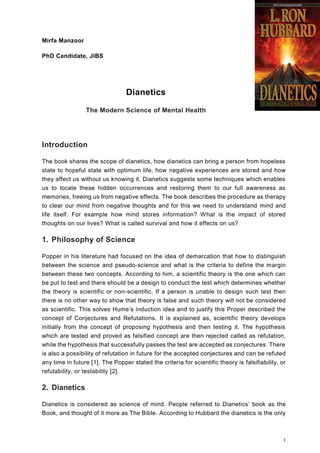Our Dianetics Diaries
Our Dianetics Diaries
Blog Article
9 Simple Techniques For Dianetics
Table of ContentsNot known Factual Statements About Dianetics Things about DianeticsThe smart Trick of Dianetics That Nobody is DiscussingDianetics Things To Know Before You Buy
I could not ever before not wish to get anything that comes to mind for you- if it was or else, I would not be sitting below with you, doing this. I not just might never ever have an issue, or otherwise desire to listen to something that enters your mind for you, but I'm totally eager to understand every concept, every thought, every photo or feeling that arises or shows up for you- do not ever before believe otherwise, and if somehow you do, please just allow me recognize! Sometimes, you might have an idea, and image, concept or incident appear that does not appear to address the question, or connect to it, yet however, always do inform me regarding it, and as we proceed, the importance will emerge for you.This is integral in the basis of processing, and the topic of this conversation: the standard duties of the therapist and the client: The standard function of the therapist is, in contrast to "standard training", not to manage, which implies to apply and/or hinder, yet to rather function from the basis of EMPOWERING THE CUSTOMER.

The Basic Principles Of Dianetics
John Mcmasters revealed this fundamental truth incredibly well in among his lectures on Power processing, wherein he clarifies exactly how he was asked what this "unique propensity" was that he had for offering such excellent sessions; he had to consider that for a moment, and detected that it was what he wasn't doing, along with what he was doing: he wasn't assessing, judging, computer, or as a matter of fact, generating any type of ideas, let alone verbal expressions, after offering the command and while waiting on the computer to finish their solution to their satisfaction; he was, just and only, being present with the computer, and entirely interested.
The function of the therapist, demonstrated; that was his "unique knack". I have had my very own experience which educated me this well, very early in the video game. In 1982, having actually recently finished my training and internship on New Era Dianetics, I was running this on a COMPUTER, and there was a point in the session where (being a little bit wet behind the ears not yet having lots of hours under my belt as an expert auditor) the PC seemed to be "taking also long" to reveal anything vocally after I offered him a command.
This secret ended up being one of the most useful contribution that John ever made to the subject of therapy or auditing (Dianetics). In my simple opinion, it is the biggest contribution that anyone has actually ever made to these subjectsthe application is completely non-judgemental, non-evaluative, and empty of any kind of tip, recommendations or opinion.no preconceived schedule for people, or 'levels' that they must do
In Idenics, the only source of details regarding a customer is the specific customer. In Scientology we prided ourselves on not evaluating for individuals. All that actually implied was that the auditor did not Vocally examine for the PC in session. The registrars and values policemans examined for the computer.
Not known Facts About Dianetics

Any person that had ever seen John audit could not assist however discover an one-of-a-kind top quality in his bookkeeping."The customer's basic role is to be there with the function of relocating in the instructions of their spiritual objectives, and to freely and completely reveal and experience whatever shows up for them in responding to the inquiries and performing the instructions in the processing.
This is something to procedure as needed. Additionally, individuals often have prior experience and/or indoctrination in auditing/processing which, in some methods, and to some degrees, really misdirects them right into attitudes, concepts and actions patterns that protect against the complete realization of these functions, and so they will often tend to inhibit the expressing of what comes to mind, as in the instances provided over - Dianetics. * The first, and probably leading examples of mis-indoctrination leading to less than entirely smooth and efficient sessions, can be discovered in particular aspects of the training regimens, or "TR's":"TR's" are usually an individual's very first, or at the very least early, experience in Scientology, and while I will certainly go on to discuss what I see as the imperfections in idea and method, however, often tend to be considerably therapeutic, done as they are offered (Hubbard insists that "TR's are not refining, they are training", however factually, this page they are both handling AND training)
There is no "failing", and no rejection of the reality of this being handling. The focus, as it ought to be, is on experiencing the various other person's existence.
Dianetics for Beginners

Report this page